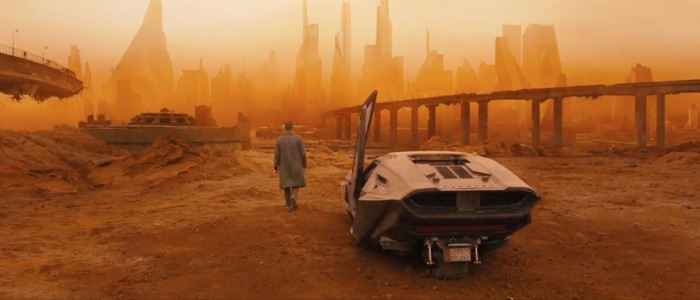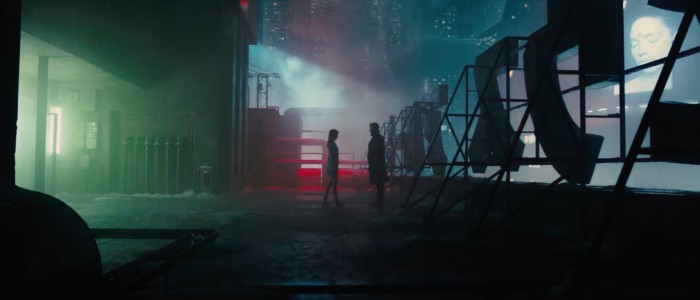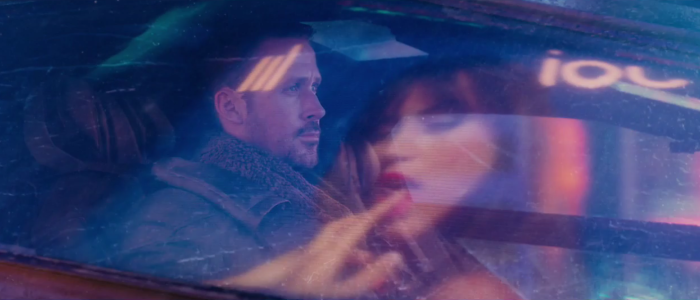'Blade Runner 2049' Director Denis Villeneuve On Creating The Future [Interview]
Making a satisfying sequel to a beloved, inspiring science-fiction classic is a tall order. But if there's a filmmaker up to the hefty task, it's Denis Villeneuve. The director behind Arrival, Sicario, Enemy, and Incendies has been turning out exceptional work. He can create an immersive and wholly tangible atmosphere, which is the kind of director a project like Blade Runner 2049 calls for.
For the sequel to Ridley Scott's 1982 film, Villeneuve is again working with cinematographer extraordinaire Roger Deakins, who shot Sicario and Prisoners. As Scott told the filmmaker, their vision of Los Angeles 2049 "was able to extend that atmospheric quality that the first movie had." During a recent roundtable interview to promote the film at Comic-Con, Villeneuve told us about his collaboration with Scott and Deakins, why he wanted to make a sequel to Blade Runner, capturing the spirit of the original, and more.
Below, check out the Denis Villeneuve interview.
What gave you the confidence to do a sequel to a movie that's so beloved?
Three things. First of all, I had Ridley Scott's blessing. That's the first thing I asked [for] once I said yes. There were some conditions. I wanted to be in front of him and looking into his eyes and hearing, "Yes, you can do it." The second thing, the screenplay I felt had strong ideas in it. I'm not saying it was a perfect screenplay. I'm just saying that I understood why Ridley felt that there was potential to do a strong movie there. The third thing was that I'd been offered a lot of movies in my life – big sci-fi movies – but I always felt it was dangerous to do those big movies because there's a lot of pressure when you make them. I said if I do it one day, it will be for something that is really worthy and really meaningful artistically for me.
Blade Runner is one of my favorite movies. I said to myself, "They will do it. No matter what we think, the studio will move forward and will make it." I don't know if I'll succeed, but I know I will give it all my love and all my skills. I will work so hard. I didn't want it to fall into the hands of someone that wouldn't. I said, at least I will be passionate about it and give my blood to make sure it respects the spirit of the first movie. I was afraid to see a sequel to Blade Runner, but I said, at least if I do it, I will have some control over it. At least then I can blame only myself.It seems like casting must have been crucial on this one.
The most important part of the film process is casting. You need strong actors. I'm a very different film director from Ridley Scott, but it's a thing that both of us have in common. We always aim for excellence with the actors in our casting; there's no compromise. One thing I'm sure of is that the performances in our movie are very strong. Very strong. I had the chance to do a massive casting around the world where I got to choose from among the best young actors.
One thing I love in the screenplay, there's a lot of strong female parts. Femininity is very important in the second movie, just like it was in the first movie. So I had the pleasure to meet actors that sometimes are well known in their own countries but less known in North America sometimes, like Sylvia Hoeks, Ana de Armas, and Carla Juri. Mackenzie Davis is in there, too, from Canada. Those young actresses are strong artists, and they brought a lot to the movie. It was a long casting process.
Who's the secret weapon on this cast?
The four of them are the movie's secret weapon, for different reasons.
 If you hadn't landed Harrison Ford, would the movie have fallen apart?
If you hadn't landed Harrison Ford, would the movie have fallen apart?
It was the other way around. Harrison was there before me. The birth of the project was, the producers from Alcon were able to unfreeze the rights, which was honestly like a master, high-skilled negotiation to get the rights back to life. They unfroze something that was very difficult, and the first thing they did was approach Ridley. They said they'd love to do it with him and Ridley said, after 15 minutes, "Fly to London now." What Ridley told me was, when he did the original Blade Runner, he had the desire to follow Deckard and different other stories. It was a universe that was open, and you have a detective in the future. It was not necessarily intended to be one movie. The desire was there. It was just that so much shit happened with the first movie that it froze there.
They went to Ridley, and they went to [co-writer] Hampton Fancher. Both of them had an idea to do a sequel that excited everybody, and the first thing they did once they got the idea was they phoned Harrison. At the early stage of screenwriting, they asked him because, without Harrison, there was no movie. Harrison said yes, and they developed the script. Harrison was there before me. I didn't go to Harrison. I had to be approved by Harrison. It's a different thing, you know? Once I agreed to do the screenplay, I had to meet Ridley to hear from his own voice that he wanted me to do this. Then I had to meet Harrison, to be scanned by Harrison and to make sure I would be Harrison Ford approved.
One of the big things about the original Blade Runner is it popularized this future-shock version of cyberpunk. The aesthetic imprint of it is all over the place now. Everyone's done a Blade Runner-esque vision of the future. How do you plan to surprise people with this movie, aesthetically?
It's a challenge. It's a movie that has been so cut-and-pasted over the years that influenced sci-fi and all the movies, even Star Wars, are influenced by Blade Runner. So how can you go back to something that was so original but became a landmark? It was a long process to find the keys.
The keys were in the screenplay and Hampton's ideas about how climate evolved. Climate for me was a key because climate means a different kind of light. With Roger Deakins, we explored those ideas and came back with something that we feel is deeply inspired by the first movie but slightly different. Let's say that the first movie was made by a director born in England under the rain. The second one was made by a Canadian director born in snow. So the light is different. It took a lot of work to try to extend and project this universe into the future and try to find something that I hope will have some kind of freshness.
You mentioned wanting to stay true to the original spirit of Blade Runner. What did that entail? What was it you wanted to preserve?
There was a melancholia in the first movie, a nostalgic feeling of loneliness and existential doubt. A kind of inner paranoia about yourself that I wanted to keep alive in the second movie. I wanted to keep the film noir aesthetic alive, as well. That was very important. And a certain kind of pacing, too, which I deeply love in the first movie. It's still made in the rhythms of [today's] movies, but I tried my best to keep that tension alive. Ridley told me that it touched him because I was able to extend that atmospheric quality that the first movie had.
 There are multiple cuts of the original film. Which one of those were you making a sequel to?
There are multiple cuts of the original film. Which one of those were you making a sequel to?
The thing is, I was raised with the first one. For me, there was one Blade Runner. At the time, there was no internet; there was no [film critic] A.O. Scott. I remember seeing the first movie and falling deeply in love with it. It became, for me, an instant classic. Me and my friends were deeply in love with it. I remember a few months later reading a review of the movie that was very bad. I became so angry because I felt the critic was all wrong because he felt that the adaptation of Phillip K. Dick's novel was not right. I totally disagreed.
Later on, I discovered what Ridley's initial dream was and I really loved Ridley's version, too. The thing is, the key to make this movie was to be in-between. Because the first movie is the story of a human falling in love with a designed human being and the story of the other cut is the story of a replicant who doesn't know he's a replicant and slowly discovers his own identity. Those are two different stories. I felt like the key to dealing with that was in the original novel.
In the novel, the characters are doubting about themselves; they are not sure if they are replicants or not. For time to time, they're running the Voigt-Kampff on themselves to make sure they're humans. I love that idea. I decided that the movie would be on that side, too, that Deckard in the movie is as unsure as we are about what his identity is. I love that because I love mystery. That's an interesting thing to me: not the knowing who he is or not but the doubt. Harrison and Ridley are still arguing about that. If you put them in the same room, they don't agree. They start to talk to very loud. So I sat in the middle, like, "Welp."
There's a lot of secrecy surrounding this film, certainly more so than any other project you've previously worked on.
It's insane. At one point I was talking to someone in my crew, and I realized, oh, he hadn't read the screenplay. It's a movie that's designed on total secrecy, like a Star Wars movie or James Bond or something. The pressure of the internet, where every little spoiler goes viral...there's like an appetite to spoil the movies.
Did you enjoy working on something so secretive?
[Laughs] No. Two things: one, on all of my previous movies, you go and you do a movie, and people don't really care. No one was waiting for Sicario to get done. I didn't have to lock my copy of the script in a safe at night. Nobody cared. It was easy. I want the audience to see the movie knowing as little as possible.
Once I was on the jury at a film festival. I watched every movie not knowing a thing about them, not even where they were from. You sit in a dark room, and that's it. You don't know if it's a horror film or a comedy or if it's from Kazakhstan or the United States. The impact of that, in discovering a movie that way, is just so powerful. But people have seen a ton of images or trailers [from movies]. Two days ago my editor, Joe Walker, saw the new trailer and he was watching like [in shock]. I was like, "It's okay, Joe, it's okay."
But it's hard. You work very hard to keep secret and create tension or surprise, and then the marketing department just shows it all. I hope some day I will have control of that. I understand the importance of marketing and the needs involved, but I wish we could sell movies without showing so much.
 This is a much bigger movie than you've ever made, and you have Dune lined up next. Is that something you're gravitating towards on purpose or is that just happening naturally?
This is a much bigger movie than you've ever made, and you have Dune lined up next. Is that something you're gravitating towards on purpose or is that just happening naturally?
It's happening naturally, but at the same time, I never ever would've said yes to a project like this ten years ago. Each movie has its own challenges. I think it's natural, as a filmmaker, to be inspired to take bigger risks. My movies have always been bigger, one after another, from a technical point-of-view. One of my favorite movies is Lawrence of Arabia. To make a movie like that, you need a lot of knowledge and experience. I'm slowly walking in that direction.
Honestly, it's a blessing. If you'd told me ten years ago I was going to direct a Blade Runner sequel I would have laughed in your face. I would not have thought such a thing to be possible. But it happened naturally, and I had the time of my life doing this movie. To be working in that scope with these resources, to have the chance to build those sets, well... [Dropping a Roy Batty reference] I've seen things...
There were some moments on set I never thought I'd get to experience as a director. Never thought I'd have those toys, and get to use them live. Doing it live makes it real. There is a weight and a presence to it. The Empire Strikes Back was much more impressive than the others with all the CGI. I'm not a big CG fan. It's a powerful tool, but it cannot just be that. We did our best to always try to use models and real vehicles, to shoot real landscapes and have actual life in front of the camera. A lot of the shots are done in-camera. Roger Deakins was our cinematographer, and he really had the mastery to recreate the images. I'm not saying I'll do it all my life, by right now I have the energy and desire that require these kinds of resources.
Did you keep anything from set?
There were some elements that I stole [Laughs]. You know, I have a lot of respect for directors who are doing sci-fi. I realized the amount of work required to do scenes in the future, to design all your clothes and all the little devices. It's quite an exciting but exhausting journey. My admiration for Ridley Scott just skyrocketed while making this movie. It's very difficult.
***
Blade Runner 2049 opens in theaters October 6.
